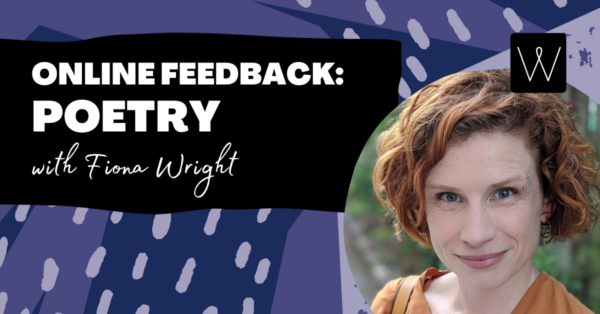Writers on Writing is our regular conversation with a writer or industry professional about the writing craft, industry insights, and their own practice. Ahead of her Online Feedback: Poetry course, we spoke to Fiona Wright about her own poetry practice, and the importance of sharing your work with others.
What inspired you to begin writing poems?
I really came to poetry accidentally, in my very last years of high school. I’d been trying to write short stories—I still can’t write short stories—but kept coming up with very short but very rhythmic, sonic little pieces. It took me a while to figure out that they were actually poems—I knew very little about poetry at the time—but as soon as I started cutting them up and playing with their structures they started making much more sense, and I got really excited about the possibilities of the form.
Tell us a bit about your own approach to poetry. How do you go from inspiration to form—and then to final version?
I almost always draft poetry with pen and paper, rather than on screen. I think there’s something about the slowness and tactility there that I find useful. Sometimes the form comes right away, more often it’s a process of trial and error, and watching to see what different constraints enable. It usually takes me quite a few drafts to get to the final version, and quite a bit of reading the poem out loud.
Who are some of the poets whose approaches to poetry have particularly inspired or influenced you?
I love Judith Beveridge’s work for the way she’s able to combine really impressive formal control with fizzy and often visceral images and subject matter; and Ellen van Neervan who is able to pack real punches that are deceptively simple in her poetry. I also really admire Pip Smith, whose poems have such imagination and energy and are often incredibly funny as well.
Your upcoming course involves peer feedback. What’s the best way to give and receive constructive critique?
I think the most effective way to give critique is to ask questions, especially where you don’t understand what the other writer is saying, or why they’ve made their particular choices. I know that for me, trying to answer these kinds of questions often opens up the work in ways I hadn’t expected, and points out any assumptions that I’ve made as well. Try to be curious, and to understand your own preferences and biases as well. It’s also important to be open-minded when receiving critique – it’s always up to you to decide whether or not the suggestions fit, but you do have to first try them on for size.
What role does collaboration play in your writing practice?
So much of writing happens entirely alone and entirely inside our own brains – I do love this, especially for its calm and quiet rigour, but it also means that it can be very easy to lose perspective. Collaboration and community are so important because of that: they keep me sane, and often stop me from despairing. I also find collaborative projects to be really energising and sparky, and that excitement almost always bleeds into the rest of my work too.
Fiona Wright is a writer, editor, and critic from Sydney. Her first book of essays, Small Acts of Disappearance, won the 2016 Kibble Award and the Queensland Literary Award for non-fiction and was shortlisted for the Stella Prize. Her poetry collections are Knuckled, which won the 2012 Dame Mary Gilmore Award, and Domestic Interior, which was nominated for a Prime Minister’s Literary Award. Her new collection of essays is The World Was Whole.
Join Fiona’s course Online Feedback: Poetry, Monday 5 February to Friday 21 June 2023
If you want to be the first to read great advice, prompts and inspiration from our incredible tutors, subscribe to our weekly e-newsletter Newsbite.
More from Writing NSW
Check out our full range of writing courses in Sydney, our online writing courses and our feedback programs to see how we can help you on your creative writing journey. Find out about our grants and prizes, as well as writing groups across NSW, and sign up to our weekly newsletter for writing events, opportunities and giveaways.

